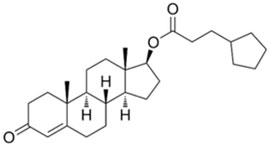Testosterone Therapy For Erectile Dysfunction

Testosterone replacement therapy can help with erectile dysfunction under certain conditions. Despite that many sources stress that testosterone replacement and erectile dysfunction (ED) do not go hand in hand, this is not always true. There are two main reasons that experts may claim testosterone and erectile dysfunction are unrelated (meaning that low T does not cause ED):
- ED is the only complaint of a patient (whether the patient has low T or not)
- The patient has normal testosterone levels
When testosterone therapy for erectile dysfunction is helpful is when a patient has several symptoms that are caused by low T levels in the blood. Erections are produced when blood flows to the penis. When testosterone levels in a man are too low (below the normal range for age, body chemistry and body composition), this can impede upon blood flow from the heart to the necessary organs, including the sexual organs. This is when replacing testosterone in the body can help to eliminate ED and help a man to have healthy, longer lasting erections and an increased sexual drive, according to WebMD.
WebMD makes it clear that low testosterone is not the only direct cause of ED in many cases. Can low testosterone cause erectile dysfunction? Yes, but this is where it gets tricky. Low testosterone has proven to cause issues such as:
- Mild depression
- Anxiety
- Stress
- Low self esteem due to looking and feeling older
- Cardiovascular issues
- Weight gain
- Loss of muscle mass
All of the above mentioned symptoms of low T can cause the inability to gain or maintain an erection. So, although not directly related, the low testosterone erectile dysfunction link is there. Indirect causes of ED can be just as devastating by taking away a person’s sexual drive, killing their ability to perform sexually and possibly ending personal relationships. This is where testosterone therapy for erectile dysfunction can help to save a person’s sexual and love life in many ways.
How Does Testosterone Replacement Therapy Help Erectile Dysfunction?
By increasing and balancing low testosterone levels in a man’s body, this can help to increase the natural and healthy flow of blood to the penis. Getting enough blood to flow to the sexual organs is how erections are obtained. Along with this physical aspect of how erections are formed, TRT can also directly impact mood which can impact sexual health.
Treatment with correctly prescribed testosterone medications can help to decrease mild depression, stop irritability, agitation, mood swings and can help a man experience more happiness and an uplifted attitude and disposition. Hence, this can have a great influence on creating an escalated sexual desire and interest in sexual relations.
WebMD advocates for TRT for ED, but warns against the link between high testosterone erectile dysfunction. When doctors prescribe testosterone injections for their patients, they must:
- Make sure the patient is over 30
- Make sure that the patient gets blood tested for low T
- Diagnose properly if low T is discovered through blood work
- Write an accurate prescription for the correct dosage of testosterone medication
- Write a detailed and accurate treatment plan for the patient
- Medically supervise the entire TRT experience and change dosages quickly if negative side effects occur
TRT can be very effective for ED and safe for patients if done correctly. Erectile dysfunction after testosterone treatment when TRT is done right can diminish ED and give a man a new outlook on his sex life and his life overall.
Testosterone Therapy For Erectile Dysfunction: What The Research Says
There are many clinical studies in the literature that advocate for testosterone therapy for erectile dysfunction. Here are a few studies and their conclusions:
- Journal of Andrology
The Journal of Andrology published an article that explored testosterone therapy and erectile dysfunction. The research concluded that the risk of developing ED gets more serious as one grows older. A source cited in the article suggested that there is expectation that approximately 26 percent of men 50 to 69 years old and 40 percent of men 60 and 69 years will have to deal with some form of erectile dysfunction during those ages. An unknown 70 percent of men will go undiagnosed, according to this literature.
The good news is that for those who are lucky enough to get diagnosed with ED due to low testosterone levels, there is help. More people are being diagnosed with ED now than ever before and this means that more men will get treatment for what is being called a vascular disease.
The conclusion of the article stated clearly that testosterone therapy alone can help to eliminate erectile dysfunction in a majority of TRT patients whose ED is caused by low T. The study shared that this should be a person’s “first line of defense” against the sexual dysfunction.
- European Urology Journal
A literature review from research in the US National Library of Medicine’s PubMed database was conducted and published in the journal European Urology. The main conclusion from this review was that a male body that does not contain an adequate amount of testosterone will not allow the proper signals to be sent to produce what it needs to keep the penis working sufficiently. This will cause erectile dysfunction. The replacement of the missing androgens can restore proper erectile physiology.
- The Journal of Urology
An article published in the Journal of Urology clearly indicated that erectile dysfunction may be related to low total testosterone and high body mass index (BMI) in older men. The study was done with 675 workers from 45 to 60 years old. There was a high emphasis put on the level of BMI with the subjects, how this related to ED and whether or not TRT could help. The results showed that BMI is definitely related to ED and that TRT can reverse ED and lead to a healthy sexual life.
It is easy to see that the research advocates for testosterone therapy for erectile dysfunction. If you are dealing with this issue and believe that TRT can help you, reach out to us. You can either fill out our online CONTACT FORM or reach us via telephone. Either way we will take the time to discuss your concerns with you, to answer your questions and to see if testosterone replacement therapy can help you.

















